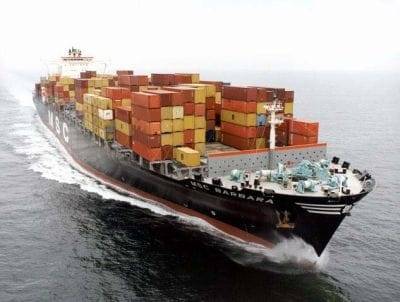Main Points In Hindi (मुख्य बातें – हिंदी में)
-
निर्यात में वृद्धि: मेडिटेरेनियन शिपिंग कंपनी (MSC) ने बताया कि नाइजीरिया ने पिछले 12 महीनों में 40,000 से अधिक बीस फीट के समकक्ष कंटेनरों का निर्यात किया, जिसमें अधिकांश निर्यात कृषि उत्पाद जैसे सोयाबीन और तिल शामिल हैं।
-
भावी निर्यात अपेक्षाएँ: MSC के उप प्रबंध निदेशक, श्री जैकब इओसो ने कहा कि 2024 में नाइजीरिया का निर्यात 2023 की तुलना में अधिक होने की उम्मीद है, और वर्तमान सरकार ने गैर-तेल निर्यात में सहायता प्रदान की है।
-
खाली कंटेनर्स की समस्या: इओसो ने उल्लेख किया कि देश से कुछ कंटेनर खाली लौट रहे हैं क्योंकि आयात की मात्रा निर्यात के मुकाबले कम है। उन्होंने यह भी स्पष्ट किया कि निर्यात की मात्रा के साथ-साथ ग्राहक रिफंड प्रक्रिया में भी सुधार की आवश्यकता है।
-
प्रौद्योगिकी और व्यापार में परिवर्तन: सीमा शुल्क नियंत्रक-जनरल, एडेवाले अडेनियि ने उद्योग में प्रौद्योगिकी, व्यापार पैटर्न और नियामक ढांचे में हो रहे बदलावों पर प्रकाश डाला, जो सीमा शुल्क प्रक्रियाओं और अंतर्राष्ट्रीय रसद को प्रभावित कर सकते हैं।
- शिक्षा और जागरूकता का महत्व: रोआम मीडिया कॉन्सेप्ट के मुख्य कार्यकारी अधिकारी, श्री इनोसेंट ओरोक ने बताया कि समुद्री क्षेत्र में नई प्रौद्योगिकियों और सेवाओं के विकास के लिए मीडिया को सही जानकारी देना आवश्यक है, ताकि प्रस्तुतिकरण और एजेंडा बेहतर ढंग से स्थापित किया जा सके।
Main Points In English(मुख्य बातें – अंग्रेज़ी में)
Here are the main points from the provided text:
-
Export Growth: Mediterranean Shipping Company reported that Nigeria exported over 40,000 twenty-foot equivalent containers (TEUs) in the last 12 months, primarily consisting of agricultural products such as soybeans and sesame seeds.
-
Increase in Future Exports: MSC’s Deputy Managing Director for Nigeria, Jacob Ioso, indicated that the volume of exports in 2024 is expected to surpass that of 2023, highlighting a growth trend in Nigeria’s non-oil exports.
-
Challenges and Infrastructure: Ioso acknowledged challenges such as natural disasters affecting agricultural production in northern Nigeria and the issue of empty containers being shipped back due to an imbalance between imports and exports.
-
Procedures for Refunds: There are specific conditions for importers to qualify for refunds on empty containers, such as returning the containers in good condition within a designated free period.
- Technological Changes and Customs: Recent changes in the maritime industry have been driven by advancements in technology and evolving global trade patterns, which have implications for customs operations and industry cooperation.


Complete News In Hindi(पूरी खबर – हिंदी में)
मेडिटेरेनियन शिपिंग कंपनी ने कहा है कि पिछले 12 महीनों के भीतर, नाइजीरिया ने दुनिया के विभिन्न हिस्सों में 40,000 से अधिक बीस फीट के समकक्ष कंटेनरों का निर्यात किया।
शिपिंग कंपनी ने कहा कि निर्यात की गई अधिकांश वस्तुएं सोयाबीन और तिल जैसी कृषि वस्तुएं थीं।
एमएससी नाइजीरिया के उप प्रबंध निदेशक, श्री जैकब इओसो ने, रोम मीडिया कॉन्सेप्ट के सहयोग से, नाइजीरिया सीमा शुल्क सेवा, टिनकन द्वीप कमांड द्वारा आयोजित समुद्री पत्रकारों के लिए एक दिवसीय प्रशिक्षण के दौरान लागोस में यह बात कही।
“हमने 40,000 से अधिक टीईयू (बीस फीट समतुल्य इकाइयां) कृषि उत्पादों का निर्यात किया है। मेरे पास निर्यात की सटीक संख्या नहीं है, लेकिन मुझे पता है कि पिछले 12 महीनों में यह 40,000 टीयूई से अधिक है,” इओसो ने कहा।
“नाइजीरिया में निर्यात की जाने वाली अधिकांश वस्तुएँ कृषि वस्तुएँ थीं। हमारे पास कई सोयाबीन, तिल और कोको हैं। हमारे पास कई अन्य फसलें हैं जिनका पिछले 12 महीनों में निर्यात किया गया है,” उन्होंने कहा।
उन्होंने कहा कि 2024 में निर्यात की मात्रा 2023 में प्राप्त निर्यात से अधिक है।
इओसो ने कहा कि देश 2024 में पिछले साल की तुलना में अधिक निर्यात कर रहा है।
उन्होंने दोहराया कि एमएससी एक वैश्विक शिपिंग कंपनी है और इस तरह, उनकी कंपनी दुनिया के हर हिस्से में निर्यात करती है।
इओसो ने यह कहते हुए कि निर्यात सभी महाद्वीपों के बीच साझा किया गया था, इस बात पर जोर दिया कि निर्यात की सटीक मात्रा और उनके पदनाम पर डेटा तैयार करना उसके लिए मुश्किल हो सकता है।
उनके अनुसार, नाइजीरियाई निर्यात में काफी वृद्धि हो रही है और यह संख्या अभी भी आयात मात्रा के सापेक्ष है।
इओसो ने इस बात पर प्रकाश डाला कि नाइजीरिया हमेशा एक आयात-आधारित अर्थव्यवस्था रही है और एक संक्रमण काल से गुजर रही है, वर्तमान सरकार ने उन गैर-तेल निर्यातों में सहायता करने में मदद की है।
उन्होंने कहा कि नाइजीरिया में कुछ प्राकृतिक आपदाओं ने उत्तर में कृषि उत्पादन को प्रभावित किया है।
खाली कंटेनरों पर बोलते हुए, इओसो ने स्वीकार किया कि कुछ कंटेनर अभी भी देश से खाली निकलते हैं क्योंकि आयात की मात्रा निर्यात के बराबर नहीं है।
इओसो ने बताया, “देश से अभी भी खाली कंटेनर भेजे जा रहे हैं क्योंकि जो निर्यात के लिए उपलब्ध है और जो आयात किया जा रहा है, उसके बीच 100 प्रतिशत मेल नहीं है।”
उन्होंने कहा कि कंपनी माल की आवाजाही में तेजी लाना चाहती है, “क्योंकि हमारा लाभ हमारे बक्सों की आवाजाही में है।”
“इसलिए हम निर्यात को प्रोत्साहित कर रहे हैं। जैसा कि मैंने कहा, हम इस समय नाइजीरिया में नंबर एक निर्यात लाइन हैं। तो स्पष्ट रूप से, निर्यातक कुछ अन्य लाइनों की तुलना में हमारी सेवा का अधिक आनंद ले रहे हैं,” उन्होंने कहा।
खाली कंटेनरों के रिफंड पर उन्होंने बताया कि किसी आयातक को अपना रिफंड लेने के लिए खाली कंटेनर को निर्धारित समय सीमा के भीतर वापस करना होगा।
“यदि कोई आयातक अपना रिफंड प्राप्त करना चाहता है, तो उसे निर्धारित निःशुल्क अवधि के भीतर अपना कंटेनर वापस करना होगा।
“और कंटेनर को क्षतिग्रस्त नहीं होना चाहिए। और उस समय, एक बार जब यह वापस आ जाता है, तो उनका हमारे पास एक खाता होता है जो ज्ञात और सत्यापित होता है,” उन्होंने समझाया।
हालाँकि, उन्होंने कहा कि रिफंड प्रक्रिया 48 घंटों के भीतर होती है, इस बात पर जोर देते हुए कि नए ग्राहकों को सत्यापित करने में अधिक समय लगता है।
इससे पहले सीमा शुल्क नियंत्रक-जनरल, एडेवाले अडेनियि ने कहा था कि पिछले कुछ वर्षों में उद्योग में महत्वपूर्ण बदलाव हुए हैं।
सीजीसी, जिसका प्रतिनिधित्व इस कार्यक्रम में टिनकैन द्वीप बंदरगाह, डेरा ननाडी के प्रभारी सीमा शुल्क क्षेत्र नियंत्रक द्वारा किया गया था, ने बताया कि परिवर्तन प्रौद्योगिकी में प्रगति, वैश्विक व्यापार पैटर्न में बदलाव और नियामक ढांचे के विकास से प्रेरित थे।
एडेनियि ने कहा कि परिवर्तन नई प्रौद्योगिकियों और प्रथाओं के साथ आते हैं जो न केवल सीमा शुल्क संचालन को प्रभावित कर सकते हैं बल्कि उद्योग के भीतर सेवा कैसे संचार और सहयोग करती है, इस पर भी प्रभाव डाल सकती है।
“आज, हम आवश्यक शब्दावली का पता लगाएंगे जो हमारे काम को रेखांकित करती है, जो हमें सीमा शुल्क प्रक्रियाओं, व्यापार अनुपालन और अंतर्राष्ट्रीय रसद की जटिलताओं को नेविगेट करने में मदद करती है।”
एडेनियि ने इस बात पर जोर दिया कि किसी भी कंपनी के पास कंटेनर नहीं हैं, इसलिए आयातकों को खाली कंटेनर वापस करने की आवश्यकता है।
इस बीच, रोआम मीडिया कॉन्सेप्ट के मुख्य कार्यकारी अधिकारी, श्री इनोसेंट ओरोक ने कहा कि प्रशिक्षण समय पर है क्योंकि समुद्री क्षेत्र में बहुत कुछ विकसित हुआ है, “विशेष रूप से नई प्रौद्योगिकियां और आईसीटी-आधारित सेवाएं जिन्हें उचित रूप से शिक्षित करने के लिए मीडिया को अवगत होना चाहिए।” , उत्पादक समुद्री क्षेत्र के लिए सूचित करें और एजेंडा निर्धारित करें।
Complete News In English(पूरी खबर – अंग्रेज़ी में)
The Mediterranean Shipping Company (MSC) has reported that Nigeria exported over 40,000 twenty-foot equivalent containers in the past 12 months to various parts of the world.
Most of the exported items were agricultural products such as soybeans and sesame seeds.
Mr. Jacob Ioso, Deputy Managing Director of MSC Nigeria, shared this information during a training session for maritime journalists organized by the Tin Can Island Command of the Nigeria Customs Service in Lagos, in partnership with Rome Media Concept.
“We have exported over 40,000 TEUs (twenty-foot equivalent units) of agricultural products. While I don’t have the exact number, I know it exceeds 40,000 TEUs in the last 12 months,” said Ioso.
He noted that most items exported from Nigeria were agricultural, including many soybeans, sesame seeds, and cocoa, along with several other crops that have been exported over the past year.
Ioso also remarked that the export volume in 2024 is expected to be higher than in 2023.
He emphasized that Nigeria is on track for greater exports in 2024 compared to the previous year.
Ioso reiterated that MSC is a global shipping company, and thus, it exports to all corners of the world.
He highlighted that the exports are shared across all continents and acknowledged that gathering precise data on the volume and designations of exports can be challenging.
According to him, Nigerian exports are experiencing significant growth, although these numbers are still in relation to import volumes.
Ioso pointed out that Nigeria has traditionally been an import-based economy and is currently undergoing a transition, with the government helping to boost non-oil exports.
He mentioned that certain natural disasters in the northern region have affected agricultural production.
Speaking about empty containers, Ioso acknowledged that some containers still leave the country empty because import volumes do not match exports.
“We are still sending empty containers from the country because there is not a 100% match between what is available for export and what is being imported,” he explained.
He stated that the company aims to expedite the movement of goods, as their profit comes from the movement of their containers.
“That’s why we are encouraging exports. As I mentioned, we are currently the number one export line in Nigeria, and clearly, exporters enjoy our service more than that of other lines,” he added.
Regarding refunds for empty containers, he noted that an importer must return the empty container within a specified timeframe to receive their refund.
“If an importer wants to receive their refund, they must return the container within the designated free period,” he explained. “The container must also be undamaged. Once it is returned, there will be an account readily known and verified with us,” he elaborated.
He added that while the refund process typically occurs within 48 hours, it takes longer to verify new customers.
Earlier, the Controller-General of Customs, Adewale Adeniyi, stated that the industry has seen significant changes in recent years.
Represented at the event by the Area Controller for the Tin Can Island Port, Dera Nanadi, the CGC noted that these changes were driven by advancements in technology, shifts in global trade patterns, and the evolution of regulatory frameworks.
Adeniyi said these changes bring new technologies and practices that can influence not only customs operations but also how services communicate and collaborate within the industry.
“Today, we will explore the essential terminology that underpins our work, helping us navigate customs processes, trade compliance, and the complexities of international logistics,” he added.
Adeniyi emphasized that no company owns containers; thus, importers need to return empty containers.
Meanwhile, Mr. Innocent Orok, CEO of Rome Media Concept, stated that the training is timely as the maritime sector has seen significant developments, “especially new technologies and ICT-based services that the media should be aware of to properly inform and shape the agenda for the productive maritime sector.”







